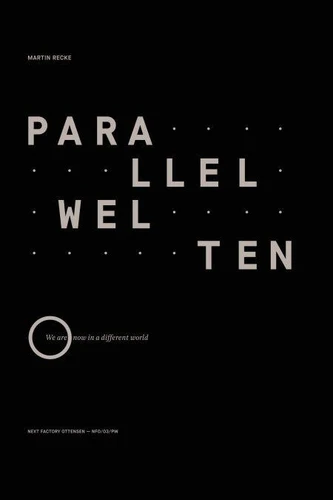Parallelwelten. We are now in a different world
Par : , ,Formats :
Disponible dans votre compte client Decitre ou Furet du Nord dès validation de votre commande. Le format ePub est :
- Compatible avec une lecture sur My Vivlio (smartphone, tablette, ordinateur)
- Compatible avec une lecture sur liseuses Vivlio
- Pour les liseuses autres que Vivlio, vous devez utiliser le logiciel Adobe Digital Edition. Non compatible avec la lecture sur les liseuses Kindle, Remarkable et Sony
 , qui est-ce ?
, qui est-ce ?Notre partenaire de plateforme de lecture numérique où vous retrouverez l'ensemble de vos ebooks gratuitement
Pour en savoir plus sur nos ebooks, consultez notre aide en ligne ici
- Nombre de pages113
- FormatePub
- ISBN978-3-948580-63-6
- EAN9783948580636
- Date de parution05/07/2021
- Protection num.pas de protection
- Taille3 Mo
- Infos supplémentairesepub
- ÉditeurNext Factory Ottensen
Résumé
Parallelwelten (parallel worlds) are worlds invisible to anyone not part of them. More and more, our reality is defined through digital products, which afford us infinitely more freedom than in the analogue past. But increased choice has also heightened our susceptibility to manipulation. Filter bubbles, fake news and alternative facts are just data that can be easily and cheaply manipulated. We now live in multiple realities that are increasingly losing touch with each other.
Reality has been turned into bits. Or is it the other way around? The digital world increasingly defines, controls and governs the analogue world. Tech companies buy and sell the raw data of human experience. Our human behaviour is turned into data, which is processed into information and then manipulated and fed back into our information diet to control our behaviour. Data is the raw material, and information - not content - is king.
Information even defines reality. This book investigates these parallel worlds from different angles: technological, corporate, scientific, cultural, economic and political. It doesn't view tech as an end in itself and something the rest of the world simply must adapt to. Instead, it asks how tech can solve real problems and make the world not a worse place, but a better one.
Reality has been turned into bits. Or is it the other way around? The digital world increasingly defines, controls and governs the analogue world. Tech companies buy and sell the raw data of human experience. Our human behaviour is turned into data, which is processed into information and then manipulated and fed back into our information diet to control our behaviour. Data is the raw material, and information - not content - is king.
Information even defines reality. This book investigates these parallel worlds from different angles: technological, corporate, scientific, cultural, economic and political. It doesn't view tech as an end in itself and something the rest of the world simply must adapt to. Instead, it asks how tech can solve real problems and make the world not a worse place, but a better one.
Parallelwelten (parallel worlds) are worlds invisible to anyone not part of them. More and more, our reality is defined through digital products, which afford us infinitely more freedom than in the analogue past. But increased choice has also heightened our susceptibility to manipulation. Filter bubbles, fake news and alternative facts are just data that can be easily and cheaply manipulated. We now live in multiple realities that are increasingly losing touch with each other.
Reality has been turned into bits. Or is it the other way around? The digital world increasingly defines, controls and governs the analogue world. Tech companies buy and sell the raw data of human experience. Our human behaviour is turned into data, which is processed into information and then manipulated and fed back into our information diet to control our behaviour. Data is the raw material, and information - not content - is king.
Information even defines reality. This book investigates these parallel worlds from different angles: technological, corporate, scientific, cultural, economic and political. It doesn't view tech as an end in itself and something the rest of the world simply must adapt to. Instead, it asks how tech can solve real problems and make the world not a worse place, but a better one.
Reality has been turned into bits. Or is it the other way around? The digital world increasingly defines, controls and governs the analogue world. Tech companies buy and sell the raw data of human experience. Our human behaviour is turned into data, which is processed into information and then manipulated and fed back into our information diet to control our behaviour. Data is the raw material, and information - not content - is king.
Information even defines reality. This book investigates these parallel worlds from different angles: technological, corporate, scientific, cultural, economic and political. It doesn't view tech as an end in itself and something the rest of the world simply must adapt to. Instead, it asks how tech can solve real problems and make the world not a worse place, but a better one.







